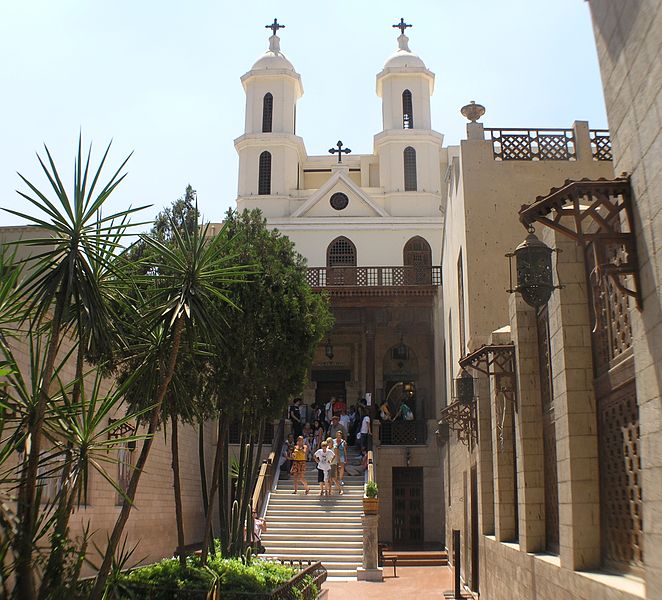
(Wikimedia Commons public domain)
This column appeared in the Deseret News on 15 November 2014:
Jesus, of course, was born and raised in Palestine. Like his apostles and earliest disciples, he was a Middle Eastern Jew. Christianity emerged from a Hebrew matrix, drawing on stories of prophets and patriarchs firmly set in the Middle East.
All Christians know this, as does anybody even slightly acquainted with the Christian story.
Yet we sometimes fail to understand the historical implications of Christianity’s Middle Eastern origins.
An Egyptian friend relates an anecdote that illustrates our point. He once surprised a European visitor to his country by identifying himself as a Christian. “Who converted your family?” the European tourist asked. “Was it the British, or the French?” “It was St. Mark,” he replied. “Who converted your family?”
Our European ancestors waited centuries, sometimes even a full millennium, to hear the message of Christianity. But Mark the Evangelist brought Christianity to Alexandria by about A.D. 49 — in other words, within two decades of the resurrection and ascension of Jesus Christ — and his message took root among the huge Jewish community there and soon spread beyond it.
Today, both the Coptic Orthodox Church and the Greek Orthodox Church of Alexandria claim him as their founder. And he likely was. The traditions of his early preaching in Egypt are very old, and had Egyptian Christians simply been inventing the story in rivalry with Rome, they probably would have chosen a more prominent figure, such as Peter, to be their founding father.
Christianity is, and has always been, a Middle Eastern religion. Although nowadays it’s prominently associated with Rome, Marburg, Canterbury and, for some of us, Salt Lake City, that hasn’t always been so. The rise and expansion of Islam have obscured the Christian faith’s deep roots in what we today term the Near or Middle East.
Saul, or Paul, grew up in Tarsus, in modern south-central Turkey, and eventually made Ephesus, nowadays a major tourist destination in western Turkey, his missionary headquarters for about three years. Later, Ephesus reputedly became the residence of the apostle John. Some traditions even say that John brought the Virgin Mary with him, in order to fulfill his pledge at the foot of the cross to care for the Savior’s mother. Eventually, John was exiled to Patmos, a small island just off the Turkish coast.
In the first centuries after the establishment of the Christian church, its most prominent leaders, saints and thinkers were overwhelmingly eastern, not western. Ignatius of Antioch served as a bishop in what is today Turkey.
Clement, Origen and Athanasius were dominant figures — Athanasius was the city’s bishop — in Alexandria, on Egypt’s Mediterranean shore. Eusebius of Caesarea, often described as the very first historian of Christianity (presumably after Luke and the authors of the other New Testament gospels), was the bishop of Caesarea Maritima, Herod’s once-flourishing port city whose spectacular ruins still attract many tourists to the northern Israeli coast today. Even Tertullian and the enormously influential bishop Augustine, two of the most important figures in the history of Latin or Western Christianity, came from North Africa — from, respectively, Carthage, in what is now called Tunisia, and the city of Hippo Regius, located in modern Algeria.
All of the first seven “ecumenical councils” of the Christian church, as they’re called — Nicea I (A.D. 325), Constantinople I (381), Ephesus I (431), Chalcedon (451), Constantinople II (553), Constantinople III (680-681), and Nicea II (787) — in the course of which the fundamental creeds of mainstream Christianity were hammered out during contentious and often raucous meetings, took place in what is today western Turkey.
Of the roughly 318 delegates who participated in the first Nicene Council —which was convened by Constantine, the “Roman” emperor who had just announced his intention to found a new capital city that, today, lies in Turkey and bears the name “Istanbul” — only a small handful came from the Latin West. The vast majority of the attendees, including St. Nicholas, the original “Santa Claus,” represented northern Africa, the eastern Mediterranean and such distant places as Georgia, Armenia, Persia, even India. This was the famous council that, for most traditional Christians, defined the relationship of the Father and the Son (the fundamental issue of the Trinity), established a uniform procedure for setting the date of Easter, and promulgated some of the earliest canon law designed to regulate church government.
Christianity is sometimes dismissed as a Western faith, the religious legacy of dead, white, European males. Such dismissals are, to be charitable, historically uninformed.
Posted from Las Vegas, Nevada











